

The New Community College, CUNY’s Multimillion-Dollar Experiment in Education. For these students, college is not an assumption but an aspiration, a potential salvation from the poverty most grew up in.
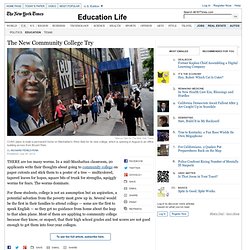
Several would be the first in their families to attend college — some are the first to speak English — so they get no guidance from home about the leap to that alien plane. Most of them are applying to community college because they know, or suspect, that their high school grades and test scores are not good enough to get them into four-year colleges. Learning Communities, Student Success, and Real Pizza.
The Benefits of Making It Harder to Learn - Do Your Job Better. By James M.

Common Core, ‘dubious causality’ By The horse race of international rankings in education is based on misconceptions that can lead countries such as the United States to consider sweeping reforms that probably won’t improve academic achievement, according to a new report.

The 2012 Brown Center Report on American Education released yesterday by the Brookings Institution makes a case against Common Core standards – arguing that California’s current standards are superior – and cautions against placing too much weight on the National Assessment of Educational Progress (NAEP) and international comparisons. A Third of Students Transfer Before Graduating - Students. PB_AccessMatters_Exec_summary. The 2012 Brown Center Report on American Education. What’s Wrong with the Completion Agenda—And What We Can Do About It. This article addresses the broad-based reform movement led by state and federal policy makers and designed to increase dramatically the number of students graduating from our nation’s colleges and universities.
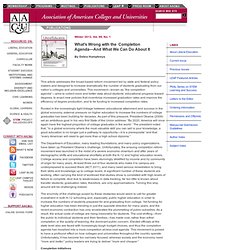
This movement—known as “the completion agenda”—aims to collect more and better data about students’ educational progress toward degrees, to enact new policies that incentivize increased graduation rates and improve the efficiency of degree production, and to tie funding to increased completion rates. Rooted in the increasingly tight linkage between educational attainment and success in the global economy, external pressure on higher education to increase the numbers of college graduates has been building for decades.
CCCSE - Center for Community College Student Engagement. The Center for Community College Student Engagement, a research and service initiative of the Program in Higher Education Leadership in the College of Education at The University of Texas at Austin, provides important information about effective educational practice in community colleges.
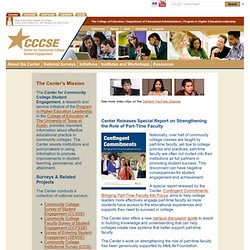
The Center assists institutions and policymakers in using information to promote improvements in student learning, persistence, and attainment. Surveys & Related Projects The Center conducts a collection of national surveys: The Center also operates several related initiatives. Quick Links. A_Matter_of_Degrees_02-02-12. Community-College Study Asks: What Helps Students Graduate? - Students. By Jennifer Gonzalez Community colleges are brimming with programs and policies designed to help students complete their studies.
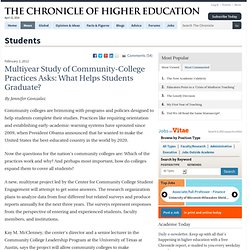
Committing%20to%20quality. Lumina Unveils a National Framework for Measuring Student Learning - Government. By Sara Hebel National conversations about the quality of higher education, as well as efforts to measure what students learn in their college careers, could be aided by developing a common understanding of what degrees mean in the United States, officials at the Lumina Foundation for Education say.
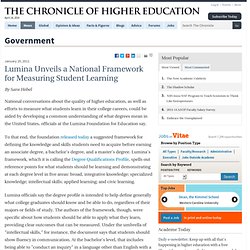
To that end, the foundation released today a suggested framework for defining the knowledge and skills students need to acquire before earning an associate degree, a bachelor's degree, and a master's degree. Lumina's framework, which it is calling the Degree Qualifications Profile, spells out reference points for what students should be learning and demonstrating at each degree level in five areas: broad, integrative knowledge; specialized knowledge; intellectual skills; applied learning; and civic learning.
Community college association releases voluntary accountability measures. Community colleges have long argued they are fundamentally different from four-year institutions and should be judged by different yardsticks.
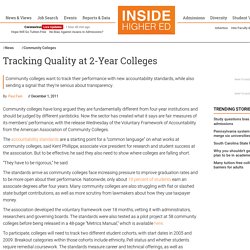
Now the sector has created what it says are fair measures of its members' performance, with the release Wednesday of the Voluntary Framework of Accountability from the American Association of Community Colleges. The accountability standards are a starting point for a “common language” on what works at community colleges, said Kent Phillippe, associate vice president for research and student success at the association. But to be effective, he said they also need to show where colleges are falling short. Community Colleges Take Major Step in Defining Role, Effectiveness. New National Accountability Measures Drill Down on Unique 2-Year Mission WASHINGTON, Dec. 1, 2011 /PRNewswire-USNewswire/ -- Following 18 months of intensive research, analysis and pilot testing, the American Association of Community Colleges (AACC) and its partners today launch the first-ever custom framework to measure how 2-year colleges perform in serving their more than 13 million students.
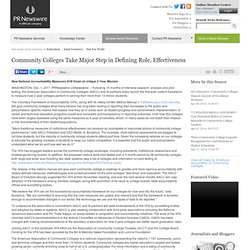
Nuancing of Access and Success. Because the nation is rightly fixed on improving degree completion rates, the discussion about America’s higher education agenda is at risk of becoming so pedestrian that terms like access and success lose their meaning.
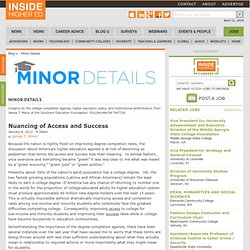
In similar fashion, once everyone and everything became “green” it was less clear to me what was meant by a “green economy,” “green jobs” or “green politics.” Presently about 39% of the nation’s adult population has a college degree. Yet, the two fastest growing populations (Latinos and African Americans) remain the least likely to earn a college degree. If America has any chance of returning to number one in the world for the proportion of college-educated adults its higher education system must produce approximately 40 million new degree holders over the next 15 years. This is virtually impossible without dramatically improving access and completion rates among low-income and minority students who collectively face the greatest difficulties completing college. Big Study Links Good Teachers to Lasting Gain.
Study on Teacher Value Uses Data From Before Teach-to-Test Era. Report suggests approach to improving graduation rates. Colleges may be able to improve their graduation rates by gaining a better understanding of the students they enroll, according to a report being released today. The report, from the Higher Education Research Institute at the University of California at Los Angeles, brings together data from the "freshman survey" by UCLA’s Cooperative Institutional Research Program and graduation numbers from the National Student Clearinghouse and aims to help colleges determine if they have actually improved retention rates or if they have simply attracted better students. Linda DeAngelo, assistant director for research at UCLA’s Cooperative Institutional Research Program, said the study could eventually help in improving graduation rates. Physicists Seek To Lose The Lecture As Teaching Tool. The lecture is one of the oldest forms of education there is. NCAT Homepage. Khan Academy ponders what it can teach the higher education establishment.
As a fledgling voice of reform in higher education, Salman Khan is an oddity. He cannot name any higher education accrediting agencies off the top of his head. He advocates for competency-based credentialing, but has never heard of Western Governors University. He is capable of talking on the phone for a full hour without using the word “disruptive” once. Until recently, he was an analyst for a hedge fund. Here is what Khan does know: algebra, statistics, trigonometry, calculus, computer science, biology, chemistry, astronomy, physics, economics, and finance -- well enough, at least, to demonstrate the concepts via brief video tutorials on Khan Academy, his free learning website. Many have lauded Khan’s natural skill as a teacher. A 'Moneyball' Approach to College - Technology. By Marc Parry Cambridge, Mass. Educators have long held that the interactions between students and professors defy simple reduction.
Yet in several areas of campus life, colleges are converting the student experience into numbers to crunch in the name of improving education. Think of it as higher education meets Moneyball. Community_college_summit_report. A culture of assessment promotes student success. AspenCCPrizeOverview. White_House_Summit_on_Community_Colleges_Fact_Sheet. CUNY Offers Intensive Remediation Program. Colleges Err in Placing Many on Remedial Track, Studies Find.